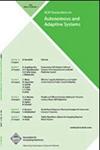SecRET: Secure Range-based Localization with Evidence Theory for Underwater Sensor Networks
IF 2.1
4区 计算机科学
Q3 COMPUTER SCIENCE, ARTIFICIAL INTELLIGENCE
引用次数: 8
Abstract
Node localization is a fundamental requirement in underwater sensor networks (UWSNs) due to the ineptness of GPS and other terrestrial localization techniques in the underwater environment. In any UWSN monitoring application, the sensed information produces a better result when it is tagged with location information. However, the deployed nodes in UWSNs are vulnerable to many attacks, and hence, can be compromised by interested parties to generate incorrect location information. Consequently, using the existing localization schemes, the deployed nodes are unable to autonomously estimate the precise location information. In this regard, similar existing schemes for terrestrial wireless sensor networks are not applicable to UWSNs due to its inherent mobility, limited bandwidth availability, strict energy constraints, and high bit-error rates. In this article, we propose SecRET, a Secure Range-based localization scheme empowered by Evidence Theory for UWSNs. With trust-based computations, the proposed scheme, SecRET, enables the unlocalized nodes to select the most reliable set of anchors with low resource consumption. Thus, the proposed scheme is adaptive to many attacks in UWSN environment. NS-3 based performance evaluation indicates that SecRET maintains energy-efficiency of the deployed nodes while ensuring efficient and secure localization, despite the presence of compromised nodes under various attacks.秘密:水下传感器网络中基于距离的证据理论安全定位
由于GPS和其他地面定位技术在水下环境中的不足,节点定位是水下传感器网络(UWSNs)的基本要求。在任何UWSN监控应用中,当被位置信息标记时,传感信息产生更好的结果。然而,在uwsn中部署的节点容易受到许多攻击,因此,可能会被相关方破坏,从而生成错误的位置信息。因此,使用现有的定位方案,部署的节点无法自主估计精确的位置信息。在这方面,由于uwsn具有固有的移动性、有限的带宽可用性、严格的能量约束和高误码率,现有的类似地面无线传感器网络方案并不适用于uwsn。在本文中,我们提出SecRET,一种基于证据理论的安全范围定位方案。通过基于信任的计算,提出的SecRET方案使非局部节点能够以低资源消耗选择最可靠的锚点集。因此,该方案能够适应UWSN环境中的多种攻击。基于NS-3的性能评估表明,尽管存在受到各种攻击的受损节点,SecRET仍能保持部署节点的能效,同时确保高效安全的定位。
本文章由计算机程序翻译,如有差异,请以英文原文为准。
求助全文
约1分钟内获得全文
求助全文
来源期刊

ACM Transactions on Autonomous and Adaptive Systems
工程技术-计算机:理论方法
CiteScore
4.80
自引率
7.40%
发文量
9
审稿时长
>12 weeks
期刊介绍:
TAAS addresses research on autonomous and adaptive systems being undertaken by an increasingly interdisciplinary research community -- and provides a common platform under which this work can be published and disseminated. TAAS encourages contributions aimed at supporting the understanding, development, and control of such systems and of their behaviors.
TAAS addresses research on autonomous and adaptive systems being undertaken by an increasingly interdisciplinary research community - and provides a common platform under which this work can be published and disseminated. TAAS encourages contributions aimed at supporting the understanding, development, and control of such systems and of their behaviors. Contributions are expected to be based on sound and innovative theoretical models, algorithms, engineering and programming techniques, infrastructures and systems, or technological and application experiences.
 求助内容:
求助内容: 应助结果提醒方式:
应助结果提醒方式:


